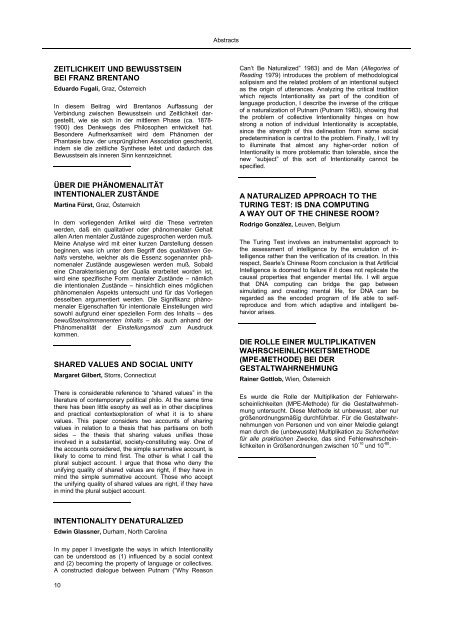Erfahrung und Analyse Experience and Analysis - Austrian Ludwig ...
Erfahrung und Analyse Experience and Analysis - Austrian Ludwig ...
Erfahrung und Analyse Experience and Analysis - Austrian Ludwig ...
You also want an ePaper? Increase the reach of your titles
YUMPU automatically turns print PDFs into web optimized ePapers that Google loves.
ZEITLICHKEIT UND BEWUSSTSEIN<br />
BEI FRANZ BRENTANO<br />
Eduardo Fugali, Graz, Österreich<br />
In diesem Beitrag wird Brentanos Auffassung der<br />
Verbindung zwischen Bewusstsein <strong>und</strong> Zeitlichkeit dargestellt,<br />
wie sie sich in der mittleren Phase (ca. 1878-<br />
1900) des Denkwegs des Philosophen entwickelt hat.<br />
Besondere Aufmerksamkeit wird dem Phänomen der<br />
Phantasie bzw. der ursprünglichen Assoziation geschenkt,<br />
indem sie die zeitliche Synthese leitet <strong>und</strong> dadurch das<br />
Bewusstsein als inneren Sinn kennzeichnet.<br />
ÜBER DIE PHÄNOMENALITÄT<br />
INTENTIONALER ZUSTÄNDE<br />
Martina Fürst, Graz, Österreich<br />
In dem vorliegenden Artikel wird die These vertreten<br />
werden, daß ein qualitativer oder phänomenaler Gehalt<br />
allen Arten mentaler Zustände zugesprochen werden muß.<br />
Meine <strong>Analyse</strong> wird mit einer kurzen Darstellung dessen<br />
beginnen, was ich unter dem Begriff des qualitativen Gehalts<br />
verstehe, welcher als die Essenz sogenannter phänomenaler<br />
Zustände ausgewiesen werden muß. Sobald<br />
eine Charakterisierung der Qualia erarbeitet worden ist,<br />
wird eine spezifische Form mentaler Zustände – nämlich<br />
die intentionalen Zustände – hinsichtlich eines möglichen<br />
phänomenalen Aspekts untersucht <strong>und</strong> für das Vorliegen<br />
desselben argumentiert werden. Die Signifikanz phänomenaler<br />
Eigenschaften für intentionale Einstellungen wird<br />
sowohl aufgr<strong>und</strong> einer speziellen Form des Inhalts – des<br />
bewußtseinsimmanenten Inhalts – als auch anh<strong>and</strong> der<br />
Phänomenalität der Einstellungsmodi zum Ausdruck<br />
kommen.<br />
SHARED VALUES AND SOCIAL UNITY<br />
Margaret Gilbert, Storrs, Connecticut<br />
There is considerable reference to “shared values” in the<br />
literature of contemporary political philo. At the same time<br />
there has been little esophy as well as in other disciplines<br />
<strong>and</strong> practical contextsxploration of what it is to share<br />
values. This paper considers two accounts of sharing<br />
values in relation to a thesis that has partisans on both<br />
sides – the thesis that sharing values unifies those<br />
involved in a substantial, society-constituting way. One of<br />
the accounts considered, the simple summative account, is<br />
likely to come to mind first. The other is what I call the<br />
plural subject account. I argue that those who deny the<br />
unifying quality of shared values are right, if they have in<br />
mind the simple summative account. Those who accept<br />
the unifying quality of shared values are right, if they have<br />
in mind the plural subject account.<br />
INTENTIONALITY DENATURALIZED<br />
Edwin Glassner, Durham, North Carolina<br />
In my paper I investigate the ways in which Intentionality<br />
can be <strong>und</strong>erstood as (1) influenced by a social context<br />
<strong>and</strong> (2) becoming the property of language or collectives.<br />
A constructed dialogue between Putnam (“Why Reason<br />
10<br />
Abstracts<br />
Can’t Be Naturalized” 1983) <strong>and</strong> de Man (Allegories of<br />
Reading 1979) introduces the problem of methodological<br />
solipsism <strong>and</strong> the related problem of an intentional subject<br />
as the origin of utterances. Analyzing the critical tradition<br />
which rejects Intentionality as part of the condition of<br />
language production, I describe the inverse of the critique<br />
of a naturalization of Putnam (Putnam 1983), showing that<br />
the problem of collective Intentionality hinges on how<br />
strong a notion of individual Intentionality is acceptable,<br />
since the strength of this delineation from some social<br />
predetermination is central to the problem. Finally, I will try<br />
to illuminate that almost any higher-order notion of<br />
Intentionality is more problematic than tolerable, since the<br />
new “subject” of this sort of Intentionality cannot be<br />
specified.<br />
A NATURALIZED APPROACH TO THE<br />
TURING TEST: IS DNA COMPUTING<br />
A WAY OUT OF THE CHINESE ROOM?<br />
Rodrigo González, Leuven, Belgium<br />
The Turing Test involves an instrumentalist approach to<br />
the assessment of intelligence by the emulation of intelligence<br />
rather than the verification of its creation. In this<br />
respect, Searle’s Chinese Room conclusion is that Artificial<br />
Intelligence is doomed to failure if it does not replicate the<br />
causal properties that engender mental life. I will argue<br />
that DNA computing can bridge the gap between<br />
simulating <strong>and</strong> creating mental life, for DNA can be<br />
regarded as the encoded program of life able to selfreproduce<br />
<strong>and</strong> from which adaptive <strong>and</strong> intelligent behavior<br />
arises.<br />
DIE ROLLE EINER MULTIPLIKATIVEN<br />
WAHRSCHEINLICHKEITSMETHODE<br />
(MPE-METHODE) BEI DER<br />
GESTALTWAHRNEHMUNG<br />
Rainer Gottlob, Wien, Österreich<br />
Es wurde die Rolle der Multiplikation der Fehlerwahrscheinlichkeiten<br />
(MPE-Methode) für die Gestaltwahrnehmung<br />
untersucht. Diese Methode ist unbewusst, aber nur<br />
größenordnungsmäßig durchführbar. Für die Gestaltwahrnehmungen<br />
von Personen <strong>und</strong> von einer Melodie gelangt<br />
man durch die (unbewusste) Multiplikation zu Sicherheiten<br />
für alle praktischen Zwecke, das sind Fehlerwahrscheinlichkeiten<br />
in Größenordnungen zwischen 10 -10 <strong>und</strong> 10 -80 .












